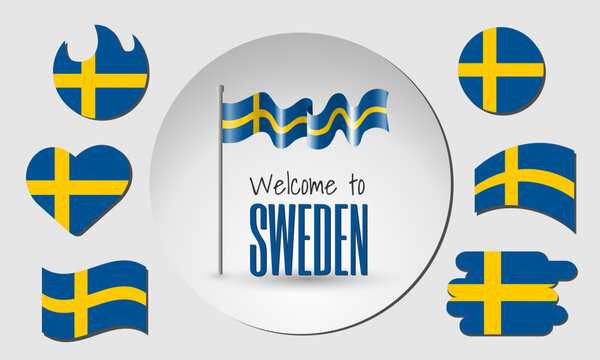Sweden (Sverige) is a Nordic country in northern Europe on the Scandinavian Peninsula. It is a parliamentary constitutional monarchy under King Carl XVI Gustaf with the prime minister as head of government, and a unicameral Riksdag of 349 members elected every four years (Riksdag;
Britannica). (
riksdagen.se)
Geography and environment
Sweden spans 450,295 km², bordered by Norway and Finland, with coasts on the Baltic Sea and Gulf of Bothnia. The terrain ranges from the Scandes mountains to boreal forests and thousands of lakes, notably Vänern (5,650 km²) and Vättern, and islands such as Gotland and Öland (CIA World Factbook;
Britannica;
Vänern;
Vättern). The highest point is Kebnekaise South (about 2,100 m) (
CIA World Factbook). Sweden’s climate is temperate to subarctic and is warming approximately twice the global average, according to the Swedish Meteorological and Hydrological Institute (
SMHI). (
cia.gov)
People, language and society
The population was 10,605,098 as of August 2025, according to Statistics Sweden (SCB) (Statistics Sweden). Swedish is the official main language (since 2009), while five national minority languages—Finnish, Meänkieli, Sami, Romani Chib and Yiddish—have protected status (
Government of Sweden: Language Act;
Riksdag;
sweden.se). The largest urban areas are Stockholm (1,652,895), Gothenburg (674,529) and Malmö (339,316) in 2023 (
Statistics Sweden). (
scb.se)
Government and law
Sweden is a parliamentary constitutional monarchy. The monarch is Carl XVI Gustaf; the prime minister since October 18, 2022 is Ulf Kristersson (Royal Court/Britannica;
Government.se). The constitution comprises four Basic Laws: the Instrument of Government, the Act of Succession, the Freedom of the Press Act (originating in 1766) and the Fundamental Law on Freedom of Expression (
Riksdag;
Britannica on 1766 Press Act). The legal system is a civil‑law–based Nordic system; the Supreme Court (Högsta domstolen) and the Supreme Administrative Court are the highest judicial bodies (
Swedish Courts;
Swedish Courts). Administratively there are 21 counties and 290 municipalities (
Statistics Sweden). (
britannica.com)
Economy and finance
Sweden is a high‑income, export‑oriented economy. In 2024, GDP was about US$610.1 billion and GDP per capita about US$57,723 (World Bank current US$) (World Bank). The central bank (Sveriges Riksbank) targets 2% inflation; in 2025 it reduced the policy rate from 2.25% to 2.00% in June and later to 1.75% in September as inflation eased toward target (
Riksbank;
Riksbank press). Major sectors include advanced manufacturing (vehicles, machinery, telecoms), mining (e.g., LKAB iron ore in Kiruna/Malmberget), forestry, pharmaceuticals and technology services (
LKAB;
Kiruna mine). Electricity generation is largely fossil‑free, dominated by hydro, nuclear and growing wind; wind supplied roughly a quarter of power in 2024, and in late 2024 wind output surpassed nuclear on some measures (
Reuters). Sweden introduced a carbon tax in 1991, raised stepwise to SEK 1,510 per tonne CO₂ by 2025, alongside the EU ETS (
Government.se). (
data.worldbank.org)
History
Human settlement dates to the Mesolithic; in the Viking Age, trade and expansion linked the region to Europe and beyond (Britannica). The Kalmar Union (1397) united Denmark, Norway and Sweden under one crown until Sweden’s break under Gustav I Vasa (elected 1523), who consolidated royal power and advanced Lutheran reformation (
Britannica: Kalmar Union;
Britannica: Gustav I Vasa). Seventeenth‑century Sweden became a Baltic great power before decline after the Great Northern War. Nineteenth‑century realignments included loss of Finland (1809), a union with Norway (1814–1905), and later a neutral stance. In the 20th century Sweden built a comprehensive welfare state (folkhemmet) under long Social Democratic leadership, then liberalized after a severe early‑1990s financial crisis that led to sweeping fiscal reforms (
Britannica: Sweden in the 20th century;
Riksbank history). Sweden joined the European Union in 1995 and rejected euro adoption in a 2003 referendum. It remains outside the euro area, using the Swedish krona (SEK) (
EU;
Valmyndigheten via Wikipedia). (
britannica.com)
Foreign and security policy
Historically militarily non‑aligned, Sweden applied for NATO membership in May 2022 and became the alliance’s 32nd member on March 7, 2024, upon depositing its instrument of accession in Washington, D.C. (NATO;
Government of Sweden). It is an EU member (since 1995) and participates in the Schengen Area (since 2001) (
EU). Sweden recognized Palestine in 2014 and is an active donor and advocate on climate finance and development (
Le Monde;
Government.se). (
nato.int)
Education, culture and science
Higher education is publicly funded; historic universities include Uppsala University (1477) and Lund University (1666), both major research institutions (Uppsala University;
Lund University). Sweden’s cultural and scientific influence includes the Nobel Prize, created by Alfred Nobel; prizes in physics, chemistry, physiology/medicine, literature, and economic sciences are awarded in Stockholm, while the Peace Prize is awarded in Oslo, annually on December 10 (
Nobel Foundation). Swedish design and popular culture—such as IKEA’s design heritage and music by ABBA—are globally known (
IKEA;
Britannica: Ingvar Kamprad). (
uu.se)
Energy and climate policy
Sweden’s electricity mix is predominantly fossil‑free, with expanding wind and longstanding hydro and nuclear capacity. The government has proposed enabling new nuclear sites and aims to meet rising demand toward 2045, when net‑zero national emissions are mandated by law (Government.se: climate framework;
Government.se: nuclear siting proposal). Sweden complements EU policy with one of the world’s highest carbon taxes, introduced in 1991 and gradually increased (
Government.se). (
government.se)
